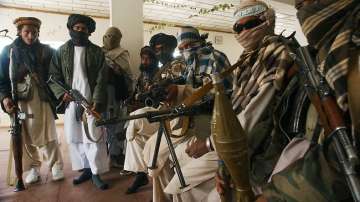Scholar, not a soldier: Meet Maulavi Haibatullah Akhundzada, Afghan Taliban’s new leader
Maulavi Haibatullah Akhundzada, who headed the judiciary during Taliban rule in the 1990s, will take over as leader of the Afghan Taliban

Kabul: The killing of Mullah Akhtar Mansour, the Afghan Taliban supremo, in a US drone attack last week threw open another debate on succession in the militant organisation. It was, after all, a second time since last summer that the organisation has had to discuss the appointment of a new leader after the news of the death of the one-eyed Mullah Mohammed Omar, the movement’s founder.
Today, the Afghan Taliban confirmed the death of Mansour and said they have appointed a successor. Maulavi Haibatullah Akhundzada, who headed the judiciary during Taliban rule in the 1990s, will take over as leader of the insurgent group, spokesman Zabihullah Mujahed said in a statement on Wednesday. He succeeds Mansour, who was killed in Pakistan on Saturday when his vehicle was struck by a U.S. drone plane, an attack believed to be the first time a Taliban leader was killed in such a way inside Pakistani territory.
“All the council members pledged allegiance to him," the statement said of Akhundzada. “The Taliban calls on all Taliban field commanders to pledge allegiance to the newly-appointed leader." The announcement came as a suicide bomber struck a minibus carrying court employees in the Afghan capital, killing at least 10 people, an official said. The Taliban promptly claimed responsibility for the attack.
Having been a low operative, not much has been known of Akhundzada -- one of Mansour's two deputies -- so far. A scholar known for extremist views, he is unlikely to back a peace process with Kabul. Here is what we know of him so far
- He was part of the Taliban administration before they were removed from power in 2001. A religious cleric, Haibatullah was the one who would issue the decrees (fatwas) on behalf of the Taliban.
- Senior Taliban figures have said Mansour's death could strengthen the movement, as he was in some ways a divisive figure. The identity of his successor was expected to be an indication of the direction the insurgency would take, either toward peace or continued war.
- Akhundzada served as the Taliban's chief justice before his appointment as a deputy to Mansour. He is known for issuing public statements justifying the existence of the extremist Taliban, their war against the Afghan government and the presence of foreign troops in Afghanistan. His views are regarded as hawkish, and he could be expected to continue in the aggressive footsteps of Mansour, at least in the early days of his leadership.
- He was also known to be close to Mullah Omar, who consulted with him on religious matters and even considered him his teacher. A convincing orator, Akhunzada was born in Kandahar — the capital during the Taliban's 1996-2001 regime. He is believed to have lived most of his life inside Afghanistan, with little evidence of travel. However, experts say, he maintained close links with the so-called Quetta Shura, the Afghan Taliban leaders said to be based in the Pakistani city of Quetta.
- A member of the Noorzai tribe, he is said to be aged around 50 years, and comes from a line of religious scholars. He leads a string of madrassas, or religious schools — figures in the Taliban say up to 10 — across Pakistan's southwestern Baluchistan province.
- A former foreign minister under the Taliban, Mullah Mohammad Ghous, said that the choice of Akhundzada was "a very wise decision." Akhundzada was well respected among Taliban of all ranks, and could be a unifying force for the fractured movement, Ghous told AP.
Akhundzada's appointment came as a surprise to some, including Ghous, who said that despite not being a top contender but a "third candidate," the new leader would rise above any personal animosity or conflict that might have arisen should either Haqqani or Yaqoub have been chosen.
The Taliban statement called on all Muslims to mourn Mansour for three days, starting from Wednesday.
It also attempted to calm any qualms among the rank and file by calling for unity and obedience to the new leader. Afghan President Ashraf Ghani, who took office in 2014, assiduously courted Pakistan in an effort to bring the Taliban into a dialogue that would lead to peace talks. Mansour, however, refused, choosing instead to intensify the war once the international combat mission drew down to a training and support role in 2015.
Mansour had officially led the Taliban since last summer, when the death of the movement's founder, the one-eyed Mullah Mohammad Omar became public. But he is believed to have run the movement in Mullah Omar's name for more than two years. The revelation of Mullah Omar's death and Mansour's deception led to widespread mistrust, with some senior Taliban leaders leaving the group to set up their own factions.
The challenge for Akhundzada is thus to unite a fractured unit to take the movement further. Whether or not he can live up to it will depend upon his ability to unite the ranks.
(With agencies)